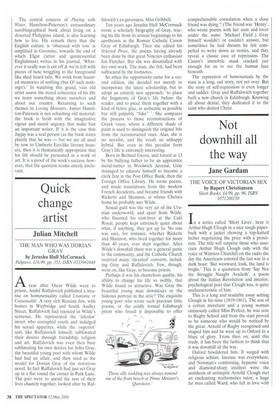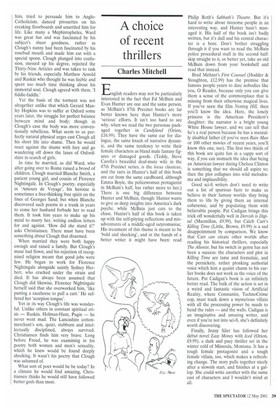Not downhill all the way
Jane Gardam
THE VOICE OF VICTORIAN SEX by Rupert Christiansen Short Books, .i4.99, pp. 96, ISBN 0571208150 In a series called 'Short Lives', here is Arthur Hugh Clough in a nice tough paperback with a jacket showing a top-hatted lecher negotiating the price with a prostitute. The title will surprise those who associate Arthur Hugh Clough only with the voice of Winston Churchill on the radio the day the Americans entered the last war in a dark hour: Tut westward, look, the land is bright.' This is a quotation from Say Not the Struggle Naught Availeth', a poem about the Italian Revolution and interior, psychological poet that Clough was, is quite uncharacteristic of him.
This is a long and readable essay setting Dough in his time (1819-1864 The son of a cotton merchant and a young woman ominously called Miss Perfect, he was sent to Rugby School and from the start proved to be someone who would be noticed by the great. Arnold of Rugby recognised and shaped him and he went up to Oxford in a blaze of glory. From then on, until this study, it has been the fashion to think that it was downhill all the way.
Oxford bewildered him. It surged with religious schism. Incense was everywhere, and Newman's comforting, hypnotic voice and diamond-sharp intellect were the antithesis of antiseptic Arnold. Clough met an enchanting mathematics tutor, a huge fat man called Ward, who fell in love with
him, tried to persuade him to AngloCatholicism, danced pirouettes on his creaking floorboards and unsettled him for life. Like many a Mephistopheles, Ward was great fun and was fascinated by his subject's sheer goodness, rather as Clough's nanny had been fascinated by his rosebud mouth and made him eat with a special spoon. Clough plunged into confusion, messed up his degree, rejected the Thirty-Nine Articles and was taken to task by his friends, especially Matthew Arnold and Ruskin who thought he was feeble and spent too much time thinking about his immortal soul. Clough agreed with them. 'I fiddle-faddle.'
Yet the basis of the torment was not altogether unlike that which Gerard Manley Hopkins was to suffer at Oxford some years later, the struggle for perfect balance between mind and body; though in Clough's case the body was more conventionally rebellious. What seem to us perfectly natural physical urges cast Clough all his short life into shame. Then he would react against the shame with fury and go wandering off down the lanes of Oxfordshire in search of girls.
In time he married, as did Ward, who after going over to Rome raised a brood of children. Clough married Blanche Smith, a patient young girl, and cousin of Florence Nightingale. In Clough's poetry, especially in 'Amours de Voyage', his heroine is sometimes a free-thinking free spirit on the lines of Georges Sand; but when Blanche discovered such poems in a trunk in years to come her husband forbade her to read them. It took him years to make up his mind to marry her, writing endless letters for and against. 'How did she stand it?' asks Christiansen. There must have been something about Clough that disarmed.
When married they were both happy enough and raised a family. But Clough's muse had flown, and his rejection of recognised religion meant that good jobs were few. He began to work for Florence Nightingale alongside saintly Sydney Herbert, who cracked under the strain and died. It has always been assumed that Clough did likewise. Florence Nightingale herself said that she overworked him, like putting a racehorse to pull a cart.' He suffered her 'scorpion tongue'.
Yet in its way Clough's life was wonderful. Unlike others in constant spiritual crisis — Ruskin, Holman-Hunt, Pugin — he never went mad. The Lancashire cottonmerchant's son, quiet, stubborn and intellectually disciplined, always survived. Christiansen finds him very brave. Long before Freud, he was examining in his poetry both women and men's sexuality, which he knew would be found deeply shocking. It wasn't his poetry that Clough was ashamed of.
What sort of poet would he be today? In a climate he would find amazing, Christiansen thinks he would still have followed better gods than most.



































































 Previous page
Previous page